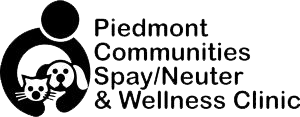Spaying in Cats
What is meant by ovariohysterectomy or spaying?
Spaying is the common term used to describe the surgical procedure known as an ovariohysterectomy. In this procedure, the ovaries and uterus are removed completely in order to sterilize a female cat.
AFTER-CARE INSTRUCTIONS
1. The next 10 days are your pet's "revovery period". Your pet must be confined indoors, preferably in a crate or small room for the entire recovery period. DO NOT let your pet run, jump, or play with other pets, or participate in any sort of strenuous activity.
2. Check your pet's incision at least twice a day. Keep the incision are dry- NO baths or swimming during the receovery period. DO NOT allow your pet to lick or chew at their incision. We have "Elizabethan" collars available if licking or chewing is a problem. These collars restrict their access to the incision, and must be applied to protect the incision and ensure proper healing. Please DO NOT apply any sort of ointments or creams to the incision, this only cuases more problems in the healing process.
3. Your pet is allowed to eat and drink this evening. Their appetite should gradually return to normal over the next several days. The anesthesia used during the surgery could possibly make your pet nauseous, so we recommend giving a small amount of "room-temperature" water before giving them any food tonight. Generally, if their stomach can tolerate the water, they will be able to keep down a small meal. DO NOT feed your pet any table scraps, milk, or any other "people" food.
Please call the clinic immediately if your pet experiences any of the following
- will not eat or drink - lethargic; refuses to move around
- diarrhea or vomiting - drainage or discharge from the incision
-the incision begins to open - blood in the urine
**If you have any questions or concerns regarding your pet's condition during the 10-day recovery period, do not hestitate to call us at (336)333-5336. If we are closed, and you feel that it is an emergency that requires immediate medical attention, we suggest either visiting your "full-service" veterinarian or an "after-hours" veterinary hosptial to have your pet's condition evaluated.
Carolina Veterinary Specialists
(336)632-0605
Any illness or injury not directly related to your pet's surgery today will need to be addressed by your full-service veterinarian. We cannot be held responsible for any conplications resulting from failure to follow post-operative care instructions. We cannot be held responsible for the cost of treating your pet if you choose to take them to another veterinary facility for post-surgical complications. We are not responsibly of your pet contracts and contagious disease for which they have not been previously and properly vaccinated.
© Copyright 2025 LifeLearn Inc. Used and/or modified with permission under license. This content written by LifeLearn Animal Health (LifeLearn Inc.) is licensed to this practice for the personal use of our clients. Any copying, printing or further distribution is prohibited without the express written consent of LifeLearn. This content does not contain all available information for any referenced medications and has not been reviewed by the FDA Center for Veterinary Medicine, or Health Canada Veterinary Drugs Directorate. This content may help answer commonly asked questions, but is not a substitute for medical advice, or a proper consultation and/or clinical examination of your pet by a veterinarian. Please contact your veterinarian if you have any questions or concerns about your pet’s health. Last updated on Sep 1, 2022.

